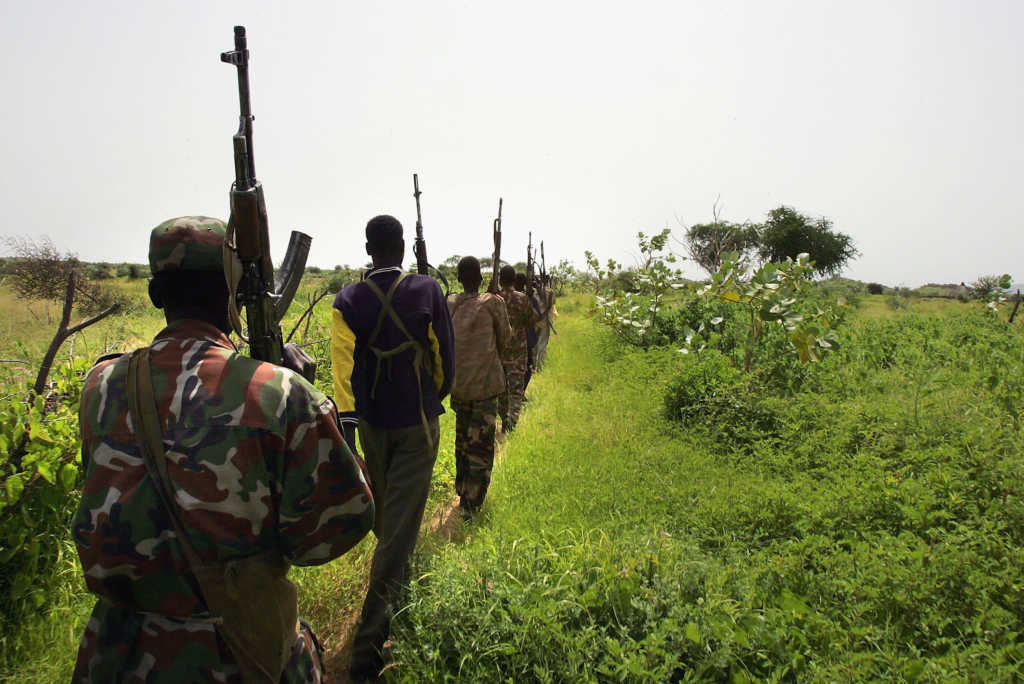A brave Christian woman has returned to her village following a series of savage attacks from Fulani Herdsmen that left her husband dead. Hanatu Solomon was left devastated after her husband was murdered in an attack on Shaforon in Northeast Nigeria’s Adamawa state. Villagers were alerted to the attack on December 4 last year, and they immediately feared for their lives.
NEXT: Survivors of Nigerian Roof Collapse Tell Their Harrowing Stories
The Islamic herdsmen have become synonymous with brutal and sustained attacks on the Christian population. Just a few days before the militants arrived, Hanatu’s husband Andu told his wife to take their five children to safety in nearby Numan.
Tragically, Andu, determined to defend his village and family home, lost his life. As the Nigerian military dropped bombs to try and thwart the savage attack, Andu was killed by one of the explosions.
“A good man was killed just like that, without anything done to his killers,” Hanatu told Open Doors USA of her husband. Now, Hanatu, who is a leader in the Lutheran Church of Christ in Nigeria, is taking the courageous step to return to her decimated village and begin a process of rebuilding.
But why would she go back to such a scene of devastation? “Leadership is by example,” she explained “l returned so that other women will be encouraged to do the same. We can’t desert our ancestral homes simply because we have been attacked–that will give our enemies victory over us.”
This faithful woman is one of just a handful who have returned to their village following the attack; when you look at the utter barbarism of these attacks, it is not hard to understand why so few come back.
“When the herdsmen launch an attack on our villages, most of the Christian women are raped,” Hanatu explained. “Some of these women feel they must hide out of disgrace; other women become pregnant from the attackers.”
“When will the killing stop?” she added “It’s either Boko Haram insurgents or herdsmen killing our people, [who] are mostly Christians,” she says. “Many Christian women have lost their husbands. Our children cannot go to school again when our husbands, the breadwinners, have been massacred.”
Speaking on the long-term impact of such violent campaigns, Hanatu believes that the tactics employed by the herdsmen are utilized in order to “wipe out” generations of believers.
“I believe these gruesome killings of the men by the herdsmen are attempts to wipe out generations of Christians. If a man is not alive to get a woman pregnant, his lineage will not continue,” she explained.
Now, Hanatu is adamant that more needs to be done. She says that the Nigerian government is shirking its responsibility to combat these vicious attackers.
Open Doors USA explained the overall impact and severity of the Fulani attacks:
“According to the Nigeria-based International Society for Civil Liberties and the Rule of Law, 3,750 people have died at the hands of Fulani militants since 2015, when Nigerian President Muhammadu Buhari–himself a Fulani–assumed office. In the last year, more than 50 villages have been attacked in the last 12 months, leaving hundreds of families mourning and hundreds of homes destroyed.”
Amnesty International has described the violence as “reaching a boiling point of total anarchy,” and called on the Nigerian government to put more measures in place to protect local village populations.
“If you are to look at how things are developing, there’s a lot of anger from different affected communities and including those who actually are bearing the brunt of losing family members at this time of the year,” said Amnesty International’s Director, Osai Ojigho, as reported by Channels TV.
“We’ve been following the incessant killings that have been happening in this sort of clashes throughout last year and, of course, at the beginning of the year we woke up to experience another wave at an escalating level that we never thought would get to this point,” she continued.
As Quartz Africa reported, just halfway through January of this year, 73 people had been already been murdered by the Fulani across Benue state. The killing was so prolific that a state-sponsored mass funeral was organized for the victims. With a shockingly high murder rate, the Fulani Herdsmen have become even more deadly than Islamist militant group Boko Haram.
“The government is very very concern about the herdsmen and farmers clashes and they are receiving attention at the highest level,” the Minister of Information and Culture, Mr Lai Mohammed said in a January statement. He has recommended a holistic approach to combatting these brutal attackers. But Amnesty International continues to criticize the government for lacking a coherent strategy for capture and prosecution.
“For us, what is really shocking is that we are yet to find a concrete response by government whether it’s at federal level or state level in terms of ensuring that those that are perpetuating these killings are arrested, are prosecuted, and actually the course of justice is allowed to proceed without any sort of fear or favour,” Ojigho added.
“It will take our communities more than 20 years to recover from these traumatic experiences,” Hanatu concluded, adding that she is also extremely worried about the continued “Islamization” of Nigeria.



